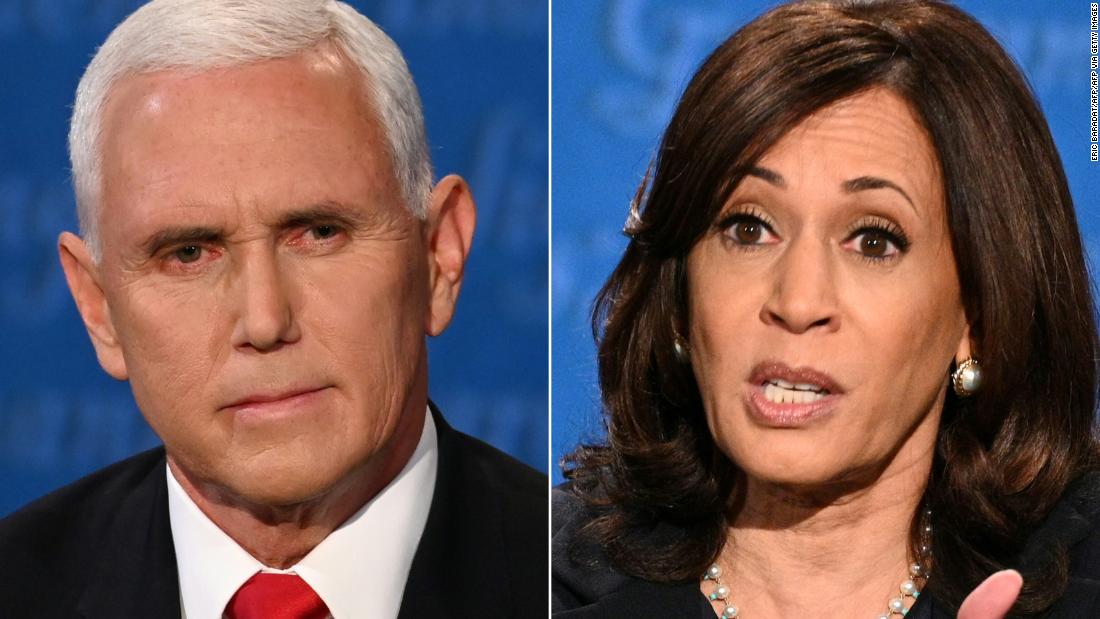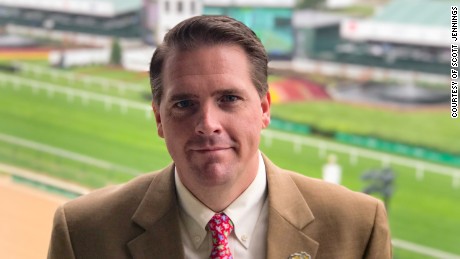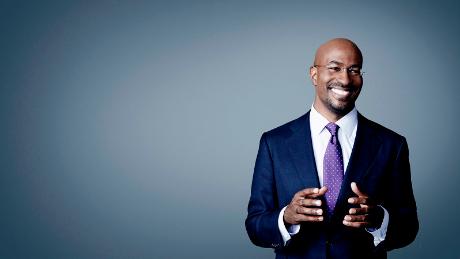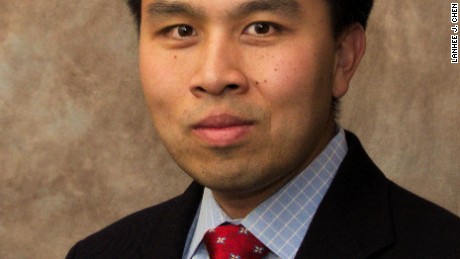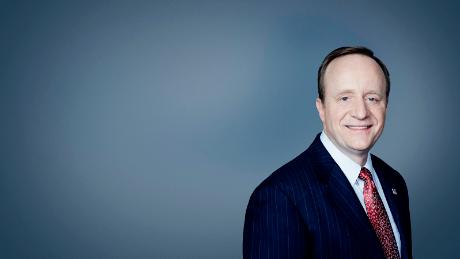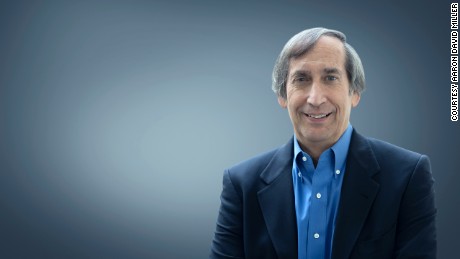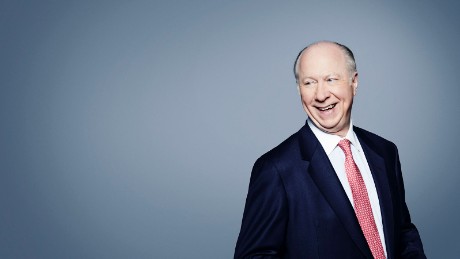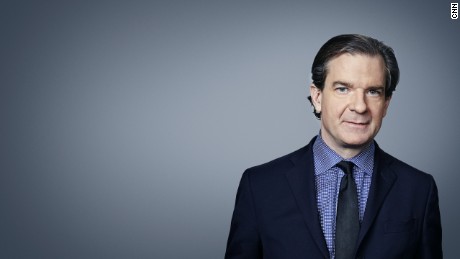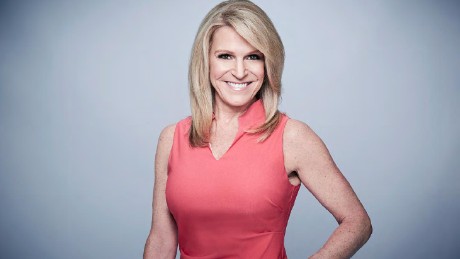Opinion: Who won the vice presidential debate?
Ah, it was nice to be back in 2012…if only for a night. The vice presidential debate was substantive on issues ranging from China to fracking to tax policy. It was unquestionably a face-off between two polished, long serving politicians trading barbs in the cadence of Washington. And it was boring. Perhaps we’ve forgotten how lovely boring could really be.
Sen. Kamala Harris came in on sky-high expectations but had a much tougher needle to thread. She and former Vice President Joe Biden are leading in the polls, so her campaign didn’t need or want to change the trajectory of the race. Her deliberative tone was important. But there would be no upside at this point, for the Biden campaign to have her get into the weeds on policies—whether they support limits on abortion or whether they would add seats to the Supreme Court—that could only turn off uncommitted voters. She avoided these.
Vice President Mike Pence, as the underdog, had no such downside and tried to move the needle by focusing on the details.
Did it matter? Nope. Has the race changed as of tonight because Pence kept talking over his time and Harris wouldn’t answer whether she supported adding justices to the Supreme Court? Definitely not. Because this isn’t 2012. And all anyone will care about from tonight is the fly on Pence’s head.
Sarah Isgur is a CNN political analyst. She is a staff writer at The Dispatch and an adjunct professor at George Washington University’s School of Media and Public Affairs. She previously worked on three Republican presidential campaigns and graduated from Harvard Law School.
Julian Zelizer: Democrats, be more direct about threat posed by Trump
There are so many moments in this debate – -and in general conversations about the campaign — where the basic unreality of the moment is something left unsaid. Sometimes it seems that the handful of disaffected Republicans in the Lincoln Project are more willing to just say the obvious.
In the end, the limitations of tonight’s debate might not matter. Harris is a skilled debater and conveyed the key points. It is easy to imagine her being president one day. She is also working with a candidate, Joe Biden, who enjoys a much stronger standing in the polls. As long as she is not making mistakes, then, right now, she is winning. The goal of a vice presidential debate is do no harm. She didn’t do any harm.
But still, there is so much more that Democrats can say about everything that has happened since 2017. This isn’t a debate about differences in policy — it’s a debate about what the state of our nation and democracy will be in decades to come. Our health, our politics, our economy, our public life is sick. It’s time for Democrats to be more direct about the threats that the nation faces under a Trump presidency.
Frida Ghitis: Pence releases his inner Trump
California Sen. Kamala Harris easily won the debate, as Vice President Mike Pence showed an unexpectedly rude side of his personality. Pence came across as Donald Trump-light, telling falsehoods, interrupting others and ignoring the rules, almost as much as the boss he praised with his usual unctuousness. But because (unlike his boss) he can put together complete sentences, Pence was able to pack in more whoppers per second than Trump did in last week’s deranged presidential debate.
Pence spoke over the two women in front of him, condescendingly ignoring moderator Susan Page’s repeated entreaties to stop talking when his time was up, and frequently interrupting his rival, who tried to keep her cool, as women often feel they must, saying “I’d like equal time.”
Harris won because she had so much more material to work with. All she had to do was cite the facts about the Trump administration’s catastrophic handling of the coronavirus. Incidentally, the failures were evident in Pence’s very presence there, when he should have been in quarantine, according to the US Centers for Disease Control’s guidelines.
Harris pointed to Trump’s failuress in paying his taxes, his efforts to get rid of Obamacare in the midst of a pandemic, the dismal state of the economy, Trump’s reluctance to clearly condemn white supremacists, and on and on. Pence responded with the familiar lies and evasions we have been hearing from Trump for months, including a few new doozies.
It was hard to contain a laugh when he claimed Trump has been very good on the environment and is listening to the scientists, when he said Trump has always told the truth and when he repeatedly misrepresented Biden’s foreign policy record.
Scott Jennings: Is Harris any good at this?
Debate moderator Susan Page was fabulous, even though it’s already clear she will be assailed by the left to explain Sen. Kamala Harris’s failure. Pro tip for the left: complaining about the moderator means you lost.
Kamala Harris flopped in epic fashion tonight, while Vice President Mike Pence followed in the footsteps of Joe Biden (2012) and Dick Cheney (2004), former vice presidents for incumbents presidents who had tanked in their opening debate, and then saw their number two’s step up and right the ship.
Pence conducted a masterclass in how to prepare for and execute a clear, winning debate strategy. He sliced and diced his way through taxes, fracking, the Green New Deal, and which ticket is best to handle America’s future recovery, winning every exchange on those topics. Pence did what Trump failed to do in his debate against Biden—recognize his opponent’s mistakes and then clearly drive home the winning point. The exchange over packing the Supreme Court was an epic failure by Harris (and Biden last week), and Pence played it perfectly. Pence flawlessly weaved in people and stories he brought along to Salt Lake City to score several points.
Biden was so eager to check identity politics boxes in picking Harris that he never stopped to ask: Is she any good at this, and does her record match my desires?
Tonight, we found out the answer (again): No.
Van Jones: Kamala Harris made history tonight
We do not have vice presidential debates so we can hear the same talking points from different people. The point is to figure out if the people on the stage can serve as commander in chief.
Sen. Kamala Harris made history tonight as a Black woman. After 90 minutes of debate, no one is saying she could not serve as President of the United States. People will quibble with her answers, or disagree with her policies. That is normal. But no one is saying this woman could not do the job. She cleared the bar.
Harris knocked the tar out of Vice President Mike Pence on the Covid-19 pandemic in the beginning and ended strong, talking about justice for all Americans. In the middle, she had to walk that tightrope that all women, especially Black women, know too well. Strong, but not too strong, empathetic but not too emotional. It was not a perfect performance, but she did what she had to do.
Vice President Pence was masterful at one thing: normalizing conservatism. He can take right-wing conspiracy theories and President Donald Trump’s grievances and make them sound mellow and unthreatening. But he also did it by being Mike the Mansplainer in Chief, constantly talking over Harris and the moderator.
CNN host Van Jones is the CEO of the REFORM Alliance, a criminal justice organization.
SE Cupp: Pence’s performance won’t play well with the people whose votes he needs
As always, I watched and listened to the vice presidential debate through the eyes and ears of white suburban women — not just because I am one, but because those voters may very well determine the fate of the election.
And what I saw was a man who talked over not just his female opponent but also the female moderator. He mansplained and condescended. He ignored the rules, the format, the questions, and moderator Susan Page’s attempts to cut him off. It wasn’t as buffoonish as President Donald Trump’s performance last week—Vice President Mike Pence remained calm, avoided petty insults and stuck mostly to talking points — but that was, in a way, worse.
Trump doesn’t have the dexterity, discipline or knowledge base to stay on topic, answer questions directly, follow the rules and avoid ad hominem. Pence does, and instead chose to disrespect the two women on that stage.
For the white suburban women who have fled the Republican Party and Trump in droves, it was an echo of the past few years, where they’ve felt disrespected and turned off by this administration’s divisiveness, fear-mongering, incompetence, corruption, bigotry and politics of revenge. It wasn’t just a bad look for the Trump-Pence ticket, it was an insult to the very women they need to stay in office.
Lanhee Chen: Pence’s biggest accomplishment of the night
The American people saw a much more normal debate tonight. And it allowed them to understand that there are stark differences in policy between what four more years of Donald Trump would look like, as compared to a Biden-Harris administration. The differences across issues as wide ranging as energy policy, criminal justice policy and taxation were particularly striking.
Vice President Pence’s ability to characterize Kamala Harris and the Democratic ticket more broadly as overly progressive was his biggest accomplishment of the night. For example, Pence’s assertion that Biden’s interest in repealing the Trump tax cuts will mean tax hikes for all voters on day one of a new administration was an effective attack that was largely left unanswered by Harris.
Also impactful was his claim that both Biden and Harris have, at times, embraced energy policies that could have real economic impacts in battleground states like Ohio and Pennsylvania. These are the economic issues on which the Trump-Pence ticket should focus their fire in the closing weeks of the campaign.
It’s unlikely that the VP debate will ultimately have any real impact on the election unless Trump can execute these substantive attacks against Joe Biden in the same disciplined way that Pence did on Wednesday. He’ll have the first real chance to do so when he meets Biden at the second presidential debate next week.
Lanhee J. Chen is the David and Diane Steffy Fellow in American Public Policy Studies at the Hoover Institution and Director of Domestic Policy Studies in the Public Policy Program at Stanford University. He served as policy director of Mitt Romney’s 2012 presidential campaign and senior adviser to Marco Rubio’s campaign in 2016.
Keith Boykin: The insect omen at Wednesday’s debate
If there was one omen about Wednesday night’s debate, it came from the fly that landed on Mike Pence’s hair and stayed there. Its unexpected appearance distracted from Pence’s message and indicated that the night was going less than perfectly for the Vice President.
Going into Wednesday night’s debate, I thought the expectations for Kamala Harris were unreasonably high. By the end of the night, however, she met them. She prosecuted the case against Donald Trump. She defended Joe Biden and her own record. And she managed to do it all while walking a racist, sexist tightrope that holds professional Black women to unfair standards of decorum.
Trailing badly in the polls, Pence needed to score a knockout to change the momentum of the campaign. Instead, he repeated empty platitudes and talking points that contradicted the truth about the coronavirus and the economy. And after months of struggling under the weight of the pandemic and an economy in freefall, Americans knew Pence was defending the indefensible.
In the end, nothing that happened in the debate did anything to move the needle. And that’s bad news for the Trump-Pence 2020 ticket.
Keith Boykin is a CNN political commentator and a former White House aide to President Bill Clinton.
Jessica Anderson: Harris is not a good look for Biden
The vice presidential debate was the one America needed.
Before this debate, the American people wondered which Kamala Harris would show up — the loyal running mate or the liberal warrior? Now we know. She showed that progressives are trying to be Joe Biden’s boss. And that cost her the debate.
Wednesday’s performance showed progressives like Harris still have the same goals as ever — but now they’re using Biden to achieve those goals.
Mike Pence, in contrast, offered a clear vision for America. An America of law and order, one that provides economic opportunity for all Americans, and one that takes on China. Most importantly, Pence has the same vision for America as President Donald Trump. There is no space between them. Trump and Pence are a team, playing for the same goal — the same cannot be said of Biden and Harris.
Jessica Anderson is Executive Director of Heritage Action, a nationwide grassroots organization. She is also the Founder and President of Moms for Safe Neighborhoods, a PAC advocating on safety and security issues and supporting President Trump. Anderson formerly served as an Associate Director of the White House Office of Management and Budget from 2017 to 2018. Follow her on Twitter at @JessAnderson2.
Paul Begala: The night belonged to Kamala Harris
It wasn’t so much a debate as a time machine. For approximately 90 minutes, the country was transported to a post-Donald Trump era of politics. Mike Pence and Kamala Harris gave us a preview of where each might lead their parties after their septuagenarian ticket-toppers retire.
If the VP debate was any indication, the Democrats’ future is smart, strong and powerful. The GOP’s future is, apparently, shameless obeisance to Trump and all he stands for.
Harris showed the world why Joe Biden’s first presidential decision was a masterstroke. She indicted the Trump regime with a relentless, remorseless command of the facts. She was cutting yet charming; righteously indignant yet likeable.
When he wasn’t interrupting, Pence was fawning over Trump’s supposed accomplishments. One day Trump will exit the stage, and Pence will want to take over. If, as I suspect, Trump is leading his party off a cliff, few will thank Pence for cheering, “Keep going, boss!”
Both in style and on substance, the night belonged to Harris. Her case that the Trump administration has been a miserable failure is self-evident in the deaths of over 210,000 Americans from Covid-19. What could be a more apt metaphor than the fact that debate organizers required a plexiglass barrier to protect Harris and others from being infected — from the head of the White House Coronavirus Task Force?
Nayyera Haq: Harris goes after Trump’s veracity
In the absence of being able to defend Trump’s veracity, Pence used his soothing voice to sound reasonable as an intentional contrast to the belligerent approach of the man at the top of his ticket. Where Trump scared off voters with his aggressive debate performance, Pence went overboard when he commended VP Biden’s public service and Senator Harris’ historic nomination. Trump has dug such a deep hole on perception that Pence literally resorted to praising his opposition, just to gain some needed nice points.
Aaron David Miller: The most important vice presidential debate in history that won’t change a thing
Yes, this may have been the most important vice-presidential debate in American history. But even with two of the oldest presidential candidates in history, it’s hard to imagine that a vice-presidential pick is going to directly influence voters’ preference for president.
It probably won’t. But before dismissing Wednesday night’s encounter as a Seinfeld show about nothing, consider a couple of takeaways.
First, had Sen. Kamala Harris melted down, committed some galactic stumble, bumble or tumble, and failed to effectively defend former Vice President Joe Biden and attack Vice President Mike Pence, she might have hurt Biden badly, raising public concern that would have reflected badly on his judgment on a vice-presidential pick. Instead Harris performed very well (in fact better on the debate stage than her putative boss) demonstrating competency, compassion on the issues and humor and toughness in standing up to Pence.
Second, the not so invisible force hanging over the debate was the coronavirus. From the plexiglass dividers to President Donald Trump’s infection and the Covid-19 cluster in the White House to the Administration’s handling of the pandemic, this — and health care in general –is perhaps a defining issue in influencing voter perceptions and the area in which the Administration is most vulnerable. Harris did well in taking apart the administration’s record, helped by Pence’s talking points untethered from reality that made it unmistakably clear that Democrats take seriously the gravest threat to America’s public health in a century and Republicans don’t.
The bottom line is: Harris held her own and then some. So did Pence. The debate won’t change the numbers or many folks’ minds.
David Gergen: Not even the VP debate can rescue Trump’s campaign
This vice presidential debate was significantly more civil and more watchable than that shambolic event of last week. Even so, I doubt it rescued Donald Trump from the crumbling of his presidency. Mike Pence gave the best defense any Republican has made of the Trump record, but he was dealt a bad deck of cards. Meanwhile, Kamala Harris performed steadily across the night, avoiding gaffes and protecting the Democrats’ lead.
This debate was also important in advancing the political stature of Harris. She missed a few opportunities to score points, including when she failed to attack the Trump’s administration handling of a Covid outbreak in the White House itself. But, overall, her capacity to assemble strong arguments and deliver them with an infectious smile showed she is a real pro. Harris has come a long way in demonstrating that we would be in sound hands if fate calls her to the presidency.
Final point: the debate commission needs to change the structure of these debates. Moderators ask about so many topics so quickly that there is no time left for in-depth conversation. Nine topics in 90 minutes are about five too many.
David Gergen has been a White House adviser to four presidents and is a senior political analyst at CNN. A graduate of Harvard Law School, he is a professor of public service at the Harvard Kennedy School, where he founded the Center for Public Leadership.
Danielle Pletka: VP debate reminds Americans of pending danger
Wednesday’s debate between Vice President Mike Pence and would-be vice president California Sen. Kamala Harris was a pleasant reminder of a more genteel era of polite droning, when campaign speeches masqueraded as principle. This is perhaps why a reality show host won the last bout.
Scoring the round, it seemed that Pence edged Harris slightly, if only because he spoke to more than just his base. Harris effectively reminded her audience of the many Covid-related failures of this administration, but otherwise failed to move much beyond the standard Democratic Party talking points.
Pence, on the other hand, effectively underscored what to many is one of the more frightening likelihoods of a Biden-Harris administration: A packed Supreme Court. The fact that Harris refused, like former Vice President Joe Biden before her, to answer the question of whether a Biden administration would support upending the court in order to secure a liberal majority only further implies that this is indeed likely their plan.
There is much — so very much — to abhor in what has already come and may yet come from a second Trump term. Yet, with all its failings, Trump’s presidency has only accentuated the strength of American institutions (often to his chagrin). A Biden administration, coupled with a Democratic Senate and House, would potentially upend those institutions in order to secure outcomes congenial to their base. On Wednesday night, Americans were reminded of that danger.
Danielle Pletka is a senior fellow in foreign and defense policy studies at the American Enterprise Institute (AEI), where she focuses on US foreign policy generally and the Middle East specifically. Until January 2020, Pletka was the senior vice president of foreign and defense policy studies at AEI.
Peter Bergen: Mike Pence’s impossible task
The Trump administration always focuses on the visuals. The images from the debate told one story as both vice presidential candidates were separated by plexiglass and sat more than 12 feet away from each other — while Pence resorted to his usual set of bromides about the greatness of the Trump presidency,
At one point, Pence was asked why the US had fared worse than a similar industrialized democracy — Canada — with its response to the pandemic. Pence really had no good answer to that question, instead blaming China.
The Chinese certainly deserve some blame for their early missteps in Wuhan, where the virus originated, but that was back in late 2019 and early 2020. Nine months later and Pence articulated no real plan about how a second Trump administration might try and finally lick this virus.
Alice Stewart: Pence won over the undecided voters
What a difference a week makes. The vice presidential debate had less sizzle, but a lot more civility than last week’s fiery presidential debate. Vice President Mike Pence and California Sen. Kamala Harris did meet rule #1 of vice presidential debates: Do no harm.
Vice presidential debates don’t generally change the trajectory of a campaign, but the undercard debate is an opportunity to win over voters who are still on the fence.
Undecided voters often decide on style and substance over policy. With that in mind, Pence won the night. Hands down. He was calm and in command as he outlined the contrast between the Trump ticket versus the Biden-Harris ticket.
Harris’ smirks and laughs came across as abrasive and not likeable. Persona often outweighs policy with the swing voters.
Harris did little to dispel the notion of a progressive Biden agenda, including raising taxes, following the Green New Deal framework and showing potential leniency toward China. She refused to answer the question of packing the courts, and this is an important question that needs to be answered by Biden or Harris in the next few weeks of the campaign.
Rule #2 of VP debates: Support the top of the ticket. Both candidates did do that without question and without hesitation. We can only hope the next presidential debate comes off without interruptions and insults.
Alice Stewart is a CNN political commentator, fellow at the Kennedy Institute of Politics at Harvard University, and former communications director for Ted Cruz for President.
![]()


